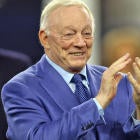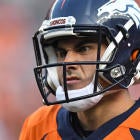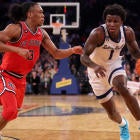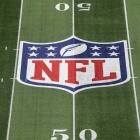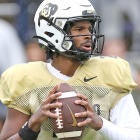I’m betting 99 percent of us didn’t know a satellite camp from a satellite dish until Jim Harbaugh took his shirt off last year.
Yup, that’s when it really hit home that Michigan’s audacious, outrageous, accomplished and -- bet you forgot this -- winning coach was conducting a daring daytime raid on foreign soil.
Those pictures of Harbaugh shirtless in Alabama were made for the page view generation. Click bait? You bet your Wolverine. Better to break the Internet than be ignored by it.
Apparently and suddenly, passports were required to cross state lines in the recruiting process. The SEC (and as junior partners in Southern football, the ACC) took it personally. A full-on invasion was underway.
No way these carpetbaggers from the North could evaluate the pride of the South in person, under the guise of a camp (sarcasm intended). No, that was too much. Harbaugh -- and before him, Penn State’s James Franklin in 2014 -- were going out of their natural region to recruit.
Not surprisingly, the NCAA banned satellite camps last week. All such camps will have to be conducted on a school's campus or at its regular practice facility. No more of the workaround “guest coach” provision that allowed Harbaugh to spread his brand and message, either.
To reiterate, 99 percent of us didn’t know or care about these camps until Harbaugh’s name was attached.
Yes, I’m lumping myself in there because, as colleague Jon Solomon wrote so eloquently last week, never has so much been made out of so little.
It’s the reaction to closing that little loophole that smacks of hypocrisy. With satellite camps shutting down, the conversation suddenly became about depriving poor kids of opportunities.
There has been talk of two- and three-star prospects no longer able to be “seen.” They suddenly couldn’t be rewarded for scraping together enough money to pay their way to the camps.
Proponents argued satellite camps provided “exposure.” I’m sorry, did that Internet that Harbaugh so expertly hijacked suddenly go down? Phone service, too?
If you’re good enough, you’ll be found. There’s 7 on 7, there are personal trainers. In a handful of states, high schools conduct spring practice.
Oh yeah, there are the regular, longstanding above-board scouting opportunities available to coaches. The term “official visit” seems to have been lost in the bluster.
None of it is exactly off the grid. There’s also a scouting tools like hudl.com, a service used by coaches, recruiting reporters and fans alike. It makes it all but impossible to be missed as long as one tries. For what I’m guessing is the price of a car ride to a satellite camp, any kid can throw his highlights up on web.
How’s that for an opportunity? Hudl brags that athletes and coaches can create “professional highlights,” The website is able to give every player “a custom profile.” Put your film up on Hudl and anyone -- everyone -- can see it.
The decade-old company out of Lincoln, Nebraska, is becoming increasingly influential in player evaluation. Players can create their own virtual combine.
I ran into it again recently working on a junior college story. The info was so detailed that there were phone numbers posted for the some of the prospects.
Here’s the further hypocrisy: If satellite camps are truly about opportunities for recruits, it’s about time to double down on that assertion.
How about providing those same opportunities on the back end? Let college players participate in the NFL Combine without penalty. If they don’t like their performance or draft projection, allow them to return to college and retain their eligibility.
That’s now the case in college basketball where prospects are allowed 10 days after the NBA Draft Combine to take their names out of the draft and keep their eligibility as long as they have not hired an agent.
Why can’t there be a similar consideration in football? I’m told this is impossible because coaches -- both NFL and college -- want roster certainty. I get that, except I’m betting only a handful of players would return to school.
Record amounts of juniors are getting bad advice judging by the scores of underclassmen coming out in recent years. Part of that may be influenced by an early -- and seemingly arbitrary -- mid-January declaration deadline.
If it’s really about student-athlete welfare, well, let’s rare back and throw that fastball. The combine is typically held in late February. That’s a difference of five or six weeks after the current declaration deadline. If “roster management” is the biggest impediment, well, it shouldn’t be.
The question, then, is increasingly becoming: Why were satellite camps necessary at all? At their core, they were recruiting camps.
This is not exactly the end of the world. Without them, I’m expecting Michigan -- and the SEC -- to continue on their current trajectories. No harm, no foul.
Satellite camps were frosting. The cake just became slightly less tasty.
Right now, it just looks like Harbaugh is still smarter than everyone else, at least when it comes to recruiting. The SEC was all but ready to declare war in that space had satellite camps continued.
Next up: You can bet there will be an abolition of conducting off-campus spring practice during spring break. No more Michigan at IMG Academy so it can spend time in the state of Florida.
For sure, it’s personal. It’s also interesting that Carson Wentz had one meaningful offer coming out of Bismarck, North Dakota -- Central Michigan. Now the North Dakota State quarterback will likely be the first or second signal caller taken in the draft.
When I was at the school last month, the Bison’s offensive coordinator told me, simply, “They [major programs] just don't recruit here. A kid like that who is playing three sports is not going to go on some traveling 7 on 7 team.”
In other words, no satellite camp was going to expose Wentz, a potential franchise quarterback.
The whole satellite camp episode was a lot more about closing off Harbaugh than opening opportunities for all those deprived prospects.















